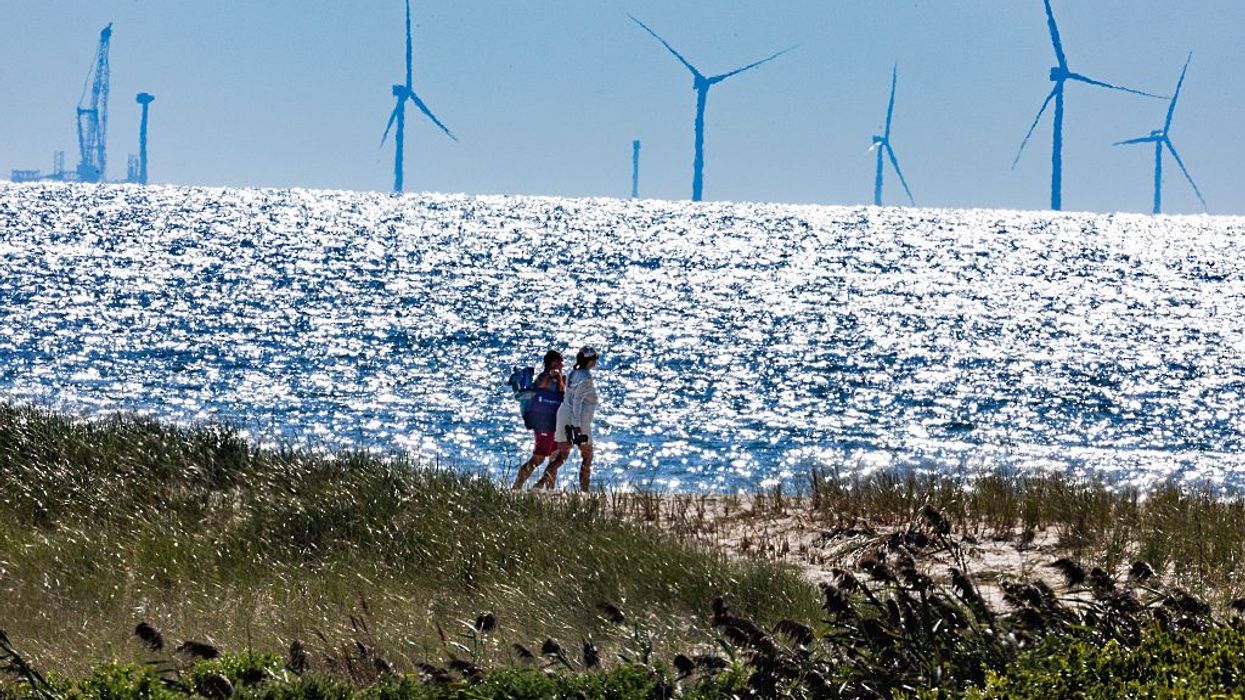December, 01 2022, 10:49am EDT

EPA Renewable Fuels 'Set Rule' to Destroy Habitat, Kill Endangered Species, Degrade Water Quality
WASHINGTON
The Environmental Protection Agency released its long-delayed proposal today establishing fuel volume requirements for corn ethanol and other biofuels for 2023, 2024 and 2025. The so-called "set rule" was the EPA's first opportunity to set such volume requirements at any level, including below the congressionally mandated floors in place over the previous decade.
Despite this nearly unfettered flexibility, the EPA chose to further increase biofuel volume requirements. Today's proposal would require approximately 15 billion gallons of conventional corn ethanol for each of the next three years, plus 5.8 billion gallons of advanced biofuels in 2023, 6.6 billion gallons of advanced biofuels in 2024, and 7.4 billion gallons in 2025.
"Billions of gallons of biofuels means millions of acres of additional habitat destroyed, more water pollution and ocean dead zones, and greater harm to endangered species," said Brett Hartl, government affairs director at the Center for Biological Diversity. "The renewable fuel program remains a colossal boondoggle that only benefits agribusinesses. Despite the rhetoric, biofuels aren't a solution to the climate crisis and actually delay the transition to electric vehicles. It's unfortunate that the EPA continues to cower before the powerful special interests that support this ludicrous program."
In its 2018 report on the renewable fuel program to Congress, the EPA concluded that 4 million to 7.8 million acres of land had already been converted to growing corn and soybeans since the program's enactment -- and that the rate of land conversion was higher in areas closer to ethanol biorefineries.
Because this corn is grown for fuel, there are fewer restrictions on the use of pesticides and fertilizers, which run off into nearby streams and rivers. This additional pollution harms endangered species such as the pallid sturgeon in the Mississippi River and worsens ocean dead zones, harming endangered sea turtles and other species.
Despite two prior rulings from the D.C. Circuit holding that the EPA failed to properly assess the renewable fuel program's impacts on endangered species, and despite litigation challenging the EPA's failure to protect endangered species in its 2022 fuels standard, the EPA still has not complied with the Endangered Species Act in the set rule.
"The EPA continues to pretend that its volume requirements don't increase the demand for biofuels, which is ludicrous," said Hartl. "If the EPA's renewable fuel program disappeared tomorrow, and it absolutely should, the United States could instead focus all its efforts on real solutions to the climate crisis. And we'd improve the health of our rivers and oceans and save endangered species in the process."
At the Center for Biological Diversity, we believe that the welfare of human beings is deeply linked to nature — to the existence in our world of a vast diversity of wild animals and plants. Because diversity has intrinsic value, and because its loss impoverishes society, we work to secure a future for all species, great and small, hovering on the brink of extinction. We do so through science, law and creative media, with a focus on protecting the lands, waters and climate that species need to survive.
(520) 623-5252LATEST NEWS
'Attack on Independent Science': Trump EPA Removes All Mention of Human-Caused Climate Crisis From Public Webpages
Climate scientist Daniel Swain called it "a deliberate effort to misinform."
Dec 09, 2025
The Trump administration has removed all references to human-caused climate change from Environmental Protection Agency webpages, as well as large amounts of data showing the dramatic warming of the climate over recent decades and the resulting risks.
According to a Tuesday report from the Washington Post, one page on the "Causes of Climate Change" stated as recently as October that "it is unequivocal that human influence has warmed the atmosphere, ocean, and land," a statement that reflects the overwhelming consensus in peer-reviewed literature on climate.
That statement is now nowhere to be found, with those that remain only mentioning "natural" causes of planetary warming like volcanic activity and variations in solar activity.
"The new, near-exclusive emphasis on natural causes of climate change on the EPA's website is now completely out of sync with all available evidence demonstrating overwhelming human influence on contemporary warming trends," explained Daniel Swain, a climate scientist at the University of California Agriculture and Natural Resources, who posted about the changes on social media.
The Intergovernmental Panel on Climate Change (IPCC), which examines tens of thousands of studies from around the globe, found that virtually all warming since the dawn of the industrial era can be attributed to human carbon emissions.
This can be confirmed using the Wayback Machine's last snapshot (from Oct 8, 2025). At some point between Oct 8 & Dec 8, major changes were made to this and other EPA climate change content. Information has either been removed completely or "adjusted" to emphasize natural causes.
[image or embed]
— Daniel Swain (@weatherwest.bsky.social) December 8, 2025 at 12:50 PM
Pages about the catastrophic results of climate change have also been scrubbed: One of them allowed users to view several climate change indicators, like the historic decline of Arctic sea ice and glaciers and the increased rates of coastal flooding due to rising sea levels. That page has been deleted entirely.
Another page, which answered frequently asked questions about climate change, now no longer includes questions like, "Is there scientific consensus that human activities are causing today’s climate change?” "How can people reduce the risks of climate change?" and "Who is most at risk from the impacts of climate change?" The page provides no indication that climate change is a human-caused phenomenon, instead only discussing natural factors.
That page links to another that has since been deleted. It once provided extensive information about the risks climate change poses to human health, "from increasing the risk of extreme heat events and heavy storms to increasing the risk of asthma attacks and changing the spread of certain diseases carried by ticks and mosquitoes." Another deleted page discussed the impacts of climate change on children's health and low-income populations.
“This is, I think, one of the more dramatic scrubbings we’ve seen so far in the climate space,” said Swain. "This website is now completely incorrect regarding the changes in climate that we’re seeing today and their causes... It’s clearly a deliberate effort to misinform.”
During his 2024 campaign for reelection, President Donald Trump and his affiliated super political action committees received more than $96 million in direct contributions from oil and gas industry donors, according to a January report from Climate Power. Since retaking office, he has moved to dramatically expand the extraction and use of planet-heating fossil fuels while eliminating investment in clean energy and electric vehicles.
Rachel Cleetus, senior policy director for the Climate and Energy Program at the Union of Concerned Scientists, said, "Deleting and distorting this scientific information only serves to give a free pass to fossil fuel polluters who are raking in profits even as communities reel from extreme heatwaves, record-breaking floods, intensified storms, and catastrophic wildfires."
Cleetus said that the purging of climate information from EPA sites was a prelude to "the likely overturning of the endangerment finding, a legal and scientific foundation for standards to limit the heat-trapping emissions driving climate change and threatening human health."
In July, EPA Administrator Lee Zeldin unveiled a proposal to rescind the 2009 finding, which determined that climate change endangers human life and serves as the legal basis for greenhouse gas regulations under the Clean Air Act.
Undermining climate science is core to that effort, which Andrew Dessler, a climate scientist at Texas A&M, said at the time, "could unravel virtually every US climate regulation on the books, from car emissions standards to power plant rules.”
Shortly after Zeldin announced the rule change, the Department of Energy cobbled together a “Climate Working Group” comprising five authors handpicked by Secretary Chris Wright to produce a climate report that disputes the IPCC's findings and the scientific consensus on climate change.
The report did not undergo peer review and omitted around 99% of the scientific literature the IPCC relied on for its comprehensive findings. A group of climate scientists that independently reviewed the paper found that it “exhibits pervasive problems with misrepresentation and selective citation of the scientific literature, cherry-picking of data, and faulty or absent statistics.”
Cleetus said Tuesday that “EPA is trying to bury the evidence on human-caused climate change, but it cannot change the reality of climate science or the harsh toll climate impacts are taking on people’s lives... This isn’t just about data on a website; it’s an attack on independent science and scientific integrity.”
Keep ReadingShow Less
Kushner Role in Paramount Scheme Shows US 'Devolving Into Caricature of Crony Capitalism'
"The Warner Bros. merger was already suspect, but now Trump’s family is getting in on the act," said one Democratic senator.
Dec 09, 2025
The revelation that Jared Kushner, US President Donald Trump's son-in-law, is playing a key role in Paramount Skydance's hostile bid for Warner Bros. Discovery underscores the extent to which the current administration's open corruption "is fundamentally distorting economic and governmental policymaking at the direct expense of the interests of the American people," a watchdog group said Tuesday.
Kushner's private equity firm, Affinity Partner, is listed in a regulatory filing as one of the organizations financing Paramount's $108 billion bid for Warner Bros., which owns CNN. Ethics experts say Kushner's involvement represents another glaring conflict of interest on top of preexisting concerns about the bid, stemming from Trump's relationship with Paramount CEO David Ellison and his billionaire father, GOP megadonor Larry Ellison.
"America is devolving into a caricature of crony capitalism," Robert Weissman, co-president of Public Citizen, said in a statement Tuesday. "Factions aiming to shrink media competition are fighting over who can show the greatest fealty to Donald Trump. Paramount seems to have won the prize, bringing in presidential son-in-law Jared Kushner—whose investment vehicle is flush with Saudi funds, deposited only because of his personal relationship with Donald Trump—as a partner."
"A working antitrust policy would block the merger of Warner Bros. Discovery with one of the existing media goliaths. It would never be influenced by personal connections to the president," Weissman added. "This case underscores that the corruption pervading the Trump administration isn’t just about making Trump and his family and hangers-on ever richer. That corruption is fundamentally distorting economic and governmental policy making, at the direct expense of the interests of the American people.”
Sen. Chris Van Hollen (D-Md.) said that "the Warner Bros. merger was already suspect, but now Trump’s family is getting in on the act."
"Paramount already had deep ties to the White House," he added, "now Trump's family will directly profit if they win."
Asked Monday about Kushner's financing role, Trump said he has "never spoken to him about it."
Paramount, which the Trump administration reportedly favored to take over Warner Bros., announced its bid for the company days after the streaming behemoth Netflix and Warner Bros. leadership reached an $83 billion acquisition deal. The president immediately criticized the Netflix agreement and pledged to intervene in the federal review process.
"The blurred line between running the government and the family's business interests is expanding each day," Scott Amey, general counsel with the Project On Government Oversight, told Reuters.
Antitrust experts and advocates have argued that both of the proposed mergers are likely illegal and should be blocked.
Matt Stoller, research director at the American Economic Liberties Project, said Monday that either merger "would further deepen the media consolidation crisis that is eroding our creative economy and freedom of expression."
"Paramount specifically would be well-positioned to manipulate the news to please the president, which David Ellison made clear it intends to do in an interview earlier today," said Stoller. "There is a reason that policymakers and workers in Hollywood have come out against each iteration of this deal. Rather than allowing further consolidation in the industry, policymakers must reregulate the market with prohibitions on vertical integration.”
Keep ReadingShow Less
'Victory for Everyone Who Pays an Electricity Bill': Judge Tosses Trump Ban on New Wind Energy Projects
"Get out of the way of the expansion of renewable energy," one clean power advocate told the Trump administration.
Dec 09, 2025
Clean energy advocates have scored at least a temporary victory after a federal judge on Monday threw out President Donald Trump's executive order that banned new wind power projects in the US.
As reported by CNBC, Judge Patti Saris of the US District Court for the District of Massachusetts tossed Trump's executive order in its entirety after finding it "arbitrary and capricious and contrary to law," and arguing that the federal government did not provide a reasoned explanation for enacting such a policy.
The executive order, which Trump signed in January, halted all permits and leases for both offshore and onshore wind power projects.
A group of 17 states, led by New York Attorney General Letitia James, sued the Trump administration earlier this year to overturn the executive order, which they labeled "an existential threat to the wind industry" in the US.
In a social media post, James hailed the judge's ruling and called the decision "a big victory in our fight to keep tackling the climate crisis and protect one of our best sources of clean, reliable, and affordable energy."
Nancy Pyne, senior adviser for Sierra Club, declared the ruling "a victory for everyone who pays an electricity bill, is part of the clean energy workforce, and breathes air."
"Americans need cheaper and more reliable energy that does not come at the expense of our health and futures," Pyne added. "We are glad to see this illegal order get vacated, and we will continue to advocate for more wind energy projects across the country to lower the cost of energy and create stable, union jobs in our communities."
Kit Kennedy, managing director for power at Natural Resources Defense Council, also emphasized the benefits to US consumers of allowing more wind-power projects to move forward.
"From the beginning of its time in office, the Trump administration put a halt to the wind energy projects that are needed to keep utility bills in check and the grid reliable," Kennedy said. "In the months since, this action has been a devastating blow to workers, electricity customers, and the reliability of the power grid."
Kennedy added that the Trump administration should accept the judge's verdict and "get out of the way of the expansion of renewable energy."
The Trump administration has the option to appeal the judge's order, although it did not respond to questions from the New York Times on Monday about whether it had plans to do so.
Trump's war against wind power comes at a time when rising electric bills, caused in large part by increased demand from energy-devouring artificial intelligence data centers, have become a hot-button political issue.
A recent report from researchers at The Century Foundation and financial abuse watchdog Protect Borrowers found that the average overdue balance on utility bills has surged by 32% over the last three years, going from $597 in 2022 to $789 in 2025. The report also estimated that roughly 1 out of every 20 US households has utility debt that is “so severe it was sent to collections or in arrears."
Keep ReadingShow Less
Most Popular


